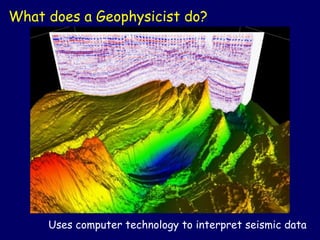All Categories
Featured
Table of Contents
Geophysical Survey - Archaeological Research in Shenton Park WA 2021
This work is increasingly contracted out, so consultancies provide another source of employment. Consultancy firms vary in size, from extremely little companies to large multinationals. Some consultancies are rather specialised in utilizing particular geophysical techniques or operating in particular areas, while others provide a more diverse range of services to their clients.
The extraction of gas from land fill websites is another area of employment and this may grow in the future. Exploration business might carry out work for building companies, public utility, mining companies and environmental firms, so geophysicists might be used in any of these settings. Other employers consist of: geological surveysgovernment bodies and agenciesuniversities and research study institutes.


Vacancies may be noted in the oil and gas sector press. Recruitment is impacted by oil price fluctuations and the level of competitors for positions varies depending upon this. Careers Days, which cover the complete series of geoscience careers and are normally attended by a variety of crucial industry employers, are run by The Geological Society.
Geophysics in Victoria Park Oz 2021
A few of the big oil and gas companies provide a full two-year structured training programme across the breadth of geophysics, consisting of the opportunity to experience operate in different teams before specialising in one area. Your training might include work on: existing wellsmagnetic and gravitational possible field data analysisresearchrock analysis. It's more normal for your initial training to be supplied on the task.

There might be a probationary period throughout which you work along with an experienced coworker. Competency-based appraisals occur frequently in the majority of companies. In smaller sized firms, and for scholastic posts, there is not likely to be any formal training - you'll be anticipated to start work straightaway and select up abilities as you go along.
If you work for a smaller business, you might discover that you need to take obligation for arranging and moneying your own development and training. If you have a geology degree, subscription of The Geological Society can be helpful for networking and for keeping up to date with the market.
Course: Basics In Geophysical Surveying in Hovea Aus 2020
You might also find it beneficial to join the PESGB (The Petroleum Exploration Society of Great Britain, which has a geophysics unique interest group. After a probationary period, and as soon as you've acquired some experience, you might advance to senior geophysicist, then team leader and after that into a senior role in management.
The ease of movement between functions depends upon the business structure. Research study at Masters or Ph, D level in a subject associated to geophysics or geosciences might aid with your profession advancement and progression. The work market within the oil and gas market is really depending on price and this might impact your chances for career development.
For skilled geophysicists, freelance consultancy offers a good route for profession advancement. As a geophysicist, you're most likely to have numerous jobs throughout your working life.
Geophysicist Jobs in City Beach WA 2021
From geophysics, it's possible to focus on seismology (completing more training to become a seismic interpreter) or to move into associated areas such as engineering geology or hazard forecast.
Choosing what to study in college is a tough option. Even if you know that your field of interest lies in science, what program of research study is ideal for you? If you make the decision to significant in physical and life sciences and pursue a career as a geophysicist, you're preparing for an interesting and successful profession.
The first step to achieving your goal of becoming a geophysicist is making a degree. Even for entry-level positions in the field of geoscience, you'll require a bachelor's degree (a geophysicist college degree) from an accredited college or university. Some research study positions need prospects to hold master's degrees or perhaps Ph.
Geophysicist Job Description in Hilton Australia 2023
Postgraduate degree are particularly crucial if you plan to teach at a four-year institution. Geophysicists use physics principles and techniques to study the gravitational, magnetic, and electrical fields of the earth. This advances researchers' understanding of both the planet's interior core and its surface. Geophysicists need to be able to: analyze rocks, photos, and other pieces of data carry out research study both in the field and in labs develop maps and charts of their findings write reports To achieve all this, students need a specialized education for geophysicist professions.
As stated above, you'll require a bachelor's degree in geoscience or an associated discipline, such as a physical science or a natural science, to land an entry-level job. However trainees can also prepare by majoring in subjects like: Biology Chemistry Computer technology Engineering Mathematics Physics The above geophysicist majors provide a more generalized method to a single scientific discipline, but many programs need trainees to take one or more geology course.
Latest Posts
Geophysical Survey Definition in Bayswater Oz 2023
Geophysical Surveys: Definition & Methods in Ardross Australia 2020
What Is Geophysics And What Do Geophysicists Do? in Maddington WA 2023